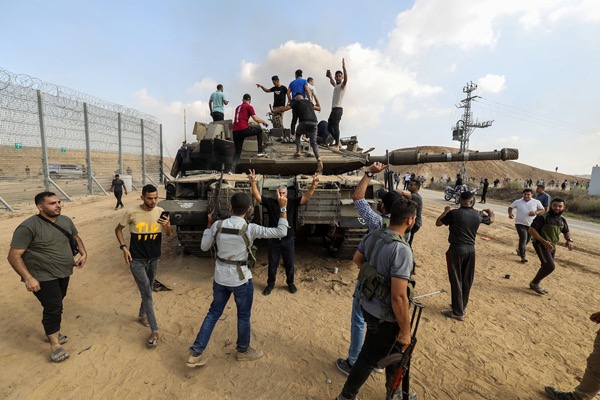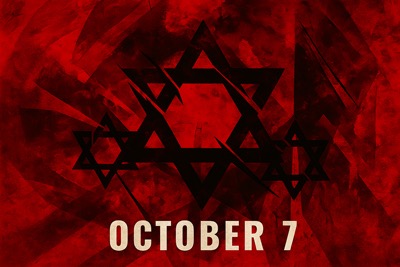
Here is my one regret from the last two years of commentary on the 7th October War: we let ourselves get sucked into arguing the running death toll coming out of Hamas's Health Ministry in Gaza.
In some ways, it was inevitable. Global outlets put those figures in every headline and chyron, so someone had to meet them on the field. Nevertheless, it was still a strategic mistake. We allowed Hamas's daily ticker to become the global yardstick for morality in this conflict.
Start with a simple truth about war reporting: immediate casualty numbers after explosions are guaranteed to be wrong. These are not fog-of-war errors from Hamas; they are straight-up lies. The Al‑Ahli explosion is a case study. Within minutes, the "500 dead" claim circled the world. Subsequent assessments from Western intelligence agencies put the likely death toll in the low hundreds, yet the first number did its work; it framed the narrative for days. We have seen this ruse time and again, and we fall for it each time it happens.
I am not saying the numbers do not matter at all; every innocent death matters infinitely to the people who loved them. But the "numbers game", the breathless, running tally, turns a legal and moral analysis into a horse race graphic. It incentivises speed over verification, from a single unverified source with a clear propaganda motive, and it collapses complex questions into a single, unreliable metric. Even organisations and reporters who regard Gaza Health Ministry figures as broadly useful acknowledge the limits of instant counts and the likelihood of later revisions when conditions improve or bodies are recovered from rubble.
Here is the broader point. If the tally is 40,000, 68,000, or 100,000, the fundamental question remains unchanged. In no other conflict do we treat a running counter as the dispositive test of conduct. Afghanistan's war killed roughly 176,000 people through direct violence by 2021: civilians, Afghan forces, insurgents, and others, according to Brown University's Costs of War project. Iraq's direct-war deaths from 2003 to 2021 total 275,000–306,000, including 185,000–209,000 civilians. Those wars are debated on strategy, aims, and legality, not by a daily, decontextualised ticker. Nobody alleges those wars were genocides.
Look around the world right now. Amidst the ongoing slaughter of innocents in Sudan, famine has been formally identified, with the UN-backed IPC system projecting expansion absent major relief. In the worst-case scenario, up to one million people could die in Sudan through war, famine, and pestilence. There are no mass marches in Western capitals keyed to that potential number and no live tickers on cable news.
Even in the Lebanon, Syria, Yemen and Iran legs of the same post–7 October war, where thousands were killed over the past two years, death tallies were barely reported, and even then only as background noise, not the central moral metric.
Why did Gaza become the exception? Partly because Hamas and Gaza's authorities understood the media economy and fed it a constant stream of numbers, which major outlets treated as the default baseline (sometimes with caveats, more often without). These figures were the central pillar of Hamas's propaganda and information strategy, with a willing queue of allies and useful idiots ready to push the numbers and "verify" them through arcane and speculative twisting of formulae and surveys.
Partly because critics of Israel made the tally itself the argument: more deaths equals more wrongdoing.
And partly because many of us on Israel's side took the bait. We tried to rebut, refine, and reclassify: are these militants or civilians? Does the ratio favour the IDF? In doing so, we validated the premise that Hamas's death ticker was the thing that mattered most.
It is not. Not even the much‑vaunted "combatant-to-civilian ratio" decides the question. International humanitarian law asks something different and more exacting: did the attacker distinguish between combatants and civilians? Were feasible precautions taken? Was the expected collateral harm not excessive in relation to the concrete and direct military advantage anticipated?
These are the only metrics of proportionality. These are the standards commanders must apply in real time, and investigators should scrutinise on a case-by-case basis. A cumulative body count, especially one compiled in real-time under combat conditions, can neither prove compliance nor establish violations. It can only signal the scale of suffering (which we should never minimise), but it cannot, by itself, answer a single legal or moral question.
Yes, specific false claims must be corrected. When an immediate number is demonstrably wrong or wildly implausible, you challenge it with evidence and move on. You do not let that back‑and‑forth define the whole conversation.
The lesson, as we advance, is simple. Do not play on the enemy's turf when you do not have to. Engage where it matters: the law of armed conflict and the campaign's purpose. What was the target? What was the necessity? What precautions were taken? What intelligence informed the strike? Those are hard questions, but they are the right ones. They do justice to the gravity of each loss without turning human life into a scoreboard.
Numbers should inform; they should not rule. Let us stop pretending a running death tally is a moral compass. It is not. The more we argue over the ticker, the more we concede the frame that Hamas designed to trap us.
This article was originally published on Substack
 Andrew Fox is a former British Army officer. Recent senior lecturer at the Royal Military Academy Sandhurst. Masters study in Middle Eastern strategy and Psychology. Now a think tank research fellow focusing on Defence, the Middle East and Disinformation. Read more about Andrew on his website. Follow Andrew on Substack
Andrew Fox is a former British Army officer. Recent senior lecturer at the Royal Military Academy Sandhurst. Masters study in Middle Eastern strategy and Psychology. Now a think tank research fellow focusing on Defence, the Middle East and Disinformation. Read more about Andrew on his website. Follow Andrew on Substack



 There Is No Peace With A Rape-Regime
There Is No Peace With A Rape-Regime
 The Rise and Fall of the Misconceptions From the River and the Sea
The Rise and Fall of the Misconceptions From the River and the Sea
 Call It October 7
Call It October 7